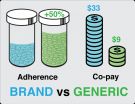(Press-News.org) VIDEO:
A study by Columbia University Medical Center (CUMC) researchers has found that the introduction of generic aromatase inhibitors (the most common type of hormone therapy), which are considerably less expensive...
Click here for more information.
NEW YORK, NY (October 27, 2014)—Although oral hormonal therapy is known to substantially reduce breast cancer recurrence in women with hormone receptor–positive tumors, about one-half of patients fail to take their medications as directed. A study by Columbia University Medical Center (CUMC) researchers has found that the introduction of generic aromatase inhibitors (the most common type of hormone therapy), which are considerably less expensive than their brand-name counterparts, increased treatment adherence by 50 percent.
The study was published today in the online issue of Journal of the National Cancer Institute.
"Our findings suggest that more effort should be made to reduce out-of-pocket costs for these potentially life-saving medications. This is especially important given the rapid increase of expensive oral cancer therapies," said study leader Dawn L. Hershman, MD, MS, associate professor of medicine at the College of Physicians and Surgeons, and associate professor of epidemiology at the Mailman School of Public Health, Columbia University Medical Center. Dr. Hershman is also leader of the Breast Cancer Program at the Herbert Irving Comprehensive Cancer Center at NewYork-Presbyterian/Columbia University Medical Center.
"We know that hormone therapy for women with hormone receptor–positive breast cancer can reduce recurrence by up to 50 percent," said Dr. Hershman."However, work by our group and others has shown that a substantial number of women discontinue treatment before the recommended five years or do not take the prescribed dose. This is increasingly important because we are starting to learn that even longer therapy—up to 10 years—may be beneficial. It's critical that we understand why people do not take their medication and what we can do to improve adherence."
In a previous study, Dr. Hershman and her colleagues found that higher co-payments for aromatase inhibitors (AIs) significantly decreased adherence to therapy. "When AIs were released in generic form in 2010, we had a unique opportunity to study whether a reduction in overall medication cost would make a difference in adherence," she said. To find out, the researchers examined the pharmacy records of 5,511 women ages 50 or older with early-stage breast cancer (requiring lumpectomy or mastectomy) who were prescribed hormonal therapy fromn 2007–12. Each patient was followed for 24 months.
The researchers found that women taking generic AIs were more 50 percent more likely to take the medications on schedule and 30 percent less likely to discontinue therapy early, compared with women taking brand name AIs. Among women on brand name generics, 33 percent discontinued therapy, compared with just 16 percent on generics.
As monthly out-of-pocket co-payments increased, adherence rates decreased. Even a small increase in monthly co-payments, from less than $15 to $15 to $30, resulted in a significant decrease in adherence," said Dr. Hershman. "That might not seem like a lot money, but it can be a big expense if you multiply it over five or ten years and you have other prescriptions to pay for."
There are several factors that can contribute to medication nonadherence. "Cost is not the only reason," said Dr. Hershman. "But it can intensify other factors such as side effects. Up to 40 percent of women taking AIs experience joint stiffness. If you add a high co-payment to the mix, that's often enough to make them discontinue therapy."
Another reason for nonadherence, at least with AIs, is that patients don't see day-to-day signs that the medications are working. "In contrast, if you have hypertension and you're getting regular blood pressure checks, you can see what happens when you stop taking your medication," she said.
Dr. Hershman offered several suggestions for increasing adherence to AIs. "First, it's important for physicians to ask patients whether they are able to pay for their medications," she said. "Many patients aren't comfortable raising this issue and will just discontinue therapy. By engaging patients in conversation, we may be able to come up with a solution, perhaps by finding less expensive alternatives or by asking pharmaceutical companies to assist patients with co-payments."
Physicians also need to remind patients that AIs are effective. "Every time a patient comes for a visit is an opportunity to reinforce the importance of adhering to treatment," Dr. Hershman said.
Finally, states could pass bills requiring health insurance companies to keep co-payments for oral cancer therapies at affordable levels, a move that several legislatures are considering. "From a public policy standpoint, we want to do everything possible to ensure that patients get life-saving medications. We will save many more lives by treating early stage breast cancer with hormonal therapy than by treating metastatic disease with chemotherapy."
Because of the growing availability of costly oral biologic therapies for cancer, the problem of medication non-adherence is likely to grow even larger. The average monthly cost of brand-name and generic AIs are $380 and $150, respectively, while the average monthly cost of oral biologics ranges from $5,000 to $8,000.
Medication non-adherence is a major issue throughout the health care system, according to the researchers. One recent study estimated that the annual cost of non-adherence to all types medications is $289 billion, or 13 percent of total U.S. health expenditures.
INFORMATION: END
Generic medications boost adherence to breast cancer therapy
'Financial toxicity' limits access to life-saving treatments
2014-10-28
ELSE PRESS RELEASES FROM THIS DATE:
Chimps plan ahead for a good breakfast
2014-10-28
New research by the University of California, Davis, shows that chimpanzees plan ahead, and sometimes take dangerous risks, to get to the best breakfast buffet early.
The study co-authored by Leo Polansky, an associate researcher in the UC Davis anthropology department, reveals that chimpanzees will find a place to sleep en route to breakfast sites and risk travel in the dark when predators are active to obtain more desired, less abundant fruits such as figs. The study is being published by the Proceedings of the National Academy of Sciences of the United States of America.
"As ...
Replacing saturated fat with polyunsaturated fat linked with lower risk of heart disease
2014-10-28
Boston, MA — People who swap 5% of the calories they consume from saturated fat sources such as red meat and butter with foods containing linoleic acid—the main polyunsaturated fat found in vegetable oil, nuts, and seeds—lowered their risk of coronary heart disease (CHD) events by 9% and their risk of death from CHD by 13%, according to a new study led by Harvard School of Public Health (HSPH) researchers. Substitution of 5% of calories from carbohydrate with linoleic acid was associated with similar reductions in risk of heart disease.
"There has been ...
Don't bet on stinginess to keep stress low
2014-10-28
Is generosity less stressful than being stingy?
QUT research, published in scientific journal Public Library of Science (PLOS) ONE, examined the physiological reactions of participants in a financial bargaining game and found that not only those receiving relatively low offers experienced stress but also those that make low offers, when compared to people who made more generous offers.
Participants were asked to play the Ultimatum Bargaining Game, in which players decide how to divide a sum of money given to them.
Player one (the proposer) proposes how to divide ...
Spices and herbs: Improving public health through flavorful eating -- a call to action
2014-10-28
Spices and herbs can play a significant role in improving America's health by helping to reduce sodium, calorie and fat intake while making healthy eating more appealing, conclude the authors of a scientific supplement published this month in the peer-reviewed journal Nutrition Today.
The publication, entitled Spices and Herbs: Improving Public Health Through Flavorful Eating, is based on the conference proceedings of a Science Summit convened by the McCormick Science Institute in partnership with the American Society for Nutrition in Washington, D.C., on May 20-21, ...
New results from VOICE associates tenofovir gel use with lower HSV-2 risk in women
2014-10-28
CAPE TOWN, October 28, 2014 – The risk of acquiring herpes simplex virus type 2 (HSV-2) was reduced by half among women in the VOICE trial who used a vaginal gel containing the antiretroviral (ARV) drug tenofovir regularly, according to researchers from the U.S. National Institutes of Health-funded Microbicide Trials Network (MTN) who conducted the study. The findings provide additional evidence that tenofovir gel, a product developed to protect against HIV, could potentially help in preventing one of the most prevalent sexually transmitted infections affecting sexually ...
What's in a name? Everything -- if you're a fruit fly
2014-10-28
A global research effort has finally resolved a major biosecurity issue: four of the world's most destructive agricultural pests are actually one and the same.
For twenty years some of the world's most damaging pest fruit flies have been almost impossible to distinguish from each other. The ability to identify pests is central to quarantine, trade, pest management and basic research.
In 2009 a coordinated research effort got underway to definitively answer this question by resolving the differences, if any, between five of the most destructive fruit flies: the Oriental ...
Variation in antibiotic bacteria in tropical forest soils may play a role in diversity
2014-10-28
Antibiotic-producing bacteria in soil are the source of many antibiotics used to combat diseases in humans and plants. But, surprisingly little is known about how these microbes impact tropical plant communities and ecosystems, where plant diversity, competition, and pathogen pressures are high.
A study published October 28 in the journal Biotropica represents a step toward a better understanding of the role antibiotic-bacteria play in the ecology of tropical forests. University of Minnesota researchers, led by Kristen Becklund, found that antibiotic production by soil ...
World losing 2,000 hectares of farm soil daily to salt damage: UN University
2014-10-28
Every day for more than 20 years, an average of 2,000 hectares of irrigated land in arid and semi-arid areas across 75 countries have been degraded by salt, according to a study by UN University's Canadian-based Institute for Water, Environment and Health, published Oct. 28.
Today an area the size of France is affected -- about 62 million hectares (20%) of the world's irrigated lands, up from 45 million hectares in the early 1990s.
Salt-degradation occurs in arid and semi-arid regions where rainfall is too low to maintain regular percolation of rainwater through the ...
Screening with tomosynthesis and mammography is cost-effective
2014-10-28
OAK BROOK, Ill. – Adding tomosynthesis to biennial digital mammography screening for women with dense breasts is likely to improve breast cancer detection at a reasonable cost relative to biennial mammography screening alone, according to a new study published online in the journal Radiology.
Mammography remains the only screening test proven to decrease mortality from breast cancer. However, mammography is less accurate in women with dense breasts for whom cancers may be masked by overlapping breast tissue.
Moreover, dense breasts compared to average density ...
Social host laws tied to less underage drinking
2014-10-28
PISCATAWAY, NJ – Teenagers who live in communities with strict "social host" laws are less likely to spend their weekends drinking at parties, according to a study in the November issue of the Journal of Studies on Alcohol and Drugs.
Many U.S. states and local communities have passed social host laws, which hold adults responsible when underage drinkers imbibe on their property. The details of the laws vary, however, and research has been mixed as to whether they actually keep kids from drinking.
In the new study, investigators focused on 50 communities in California, ...
LAST 30 PRESS RELEASES:
Nutrient uptake gets to the root of roots
Aspirin not a quick fix for preventing bowel cancer
HPV vaccination provides “sustained protection” against cervical cancer
Many post-authorization studies fail to comply with public disclosure rules
GLP-1 drugs combined with healthy lifestyle habits linked with reduced cardiovascular risk among diabetes patients
Solved: New analysis of Apollo Moon samples finally settles debate about lunar magnetic field
University of Birmingham to host national computing center
Play nicely: Children who are not friends connect better through play when given a goal
Surviving the extreme temperatures of the climate crisis calls for a revolution in home and building design
The wild can be ‘death trap’ for rescued animals
New research: Nighttime road traffic noise stresses the heart and blood vessels
Meningococcal B vaccination does not reduce gonorrhoea, trial results show
AAO-HNSF awarded grant to advance age-friendly care in otolaryngology through national initiative
Eight years running: Newsweek names Mayo Clinic ‘World’s Best Hospital’
Coffee waste turned into clean air solution: researchers develop sustainable catalyst to remove toxic hydrogen sulfide
Scientists uncover how engineered biochar and microbes work together to boost plant-based cleanup of cadmium-polluted soils
Engineered biochar could unlock more effective and scalable solutions for soil and water pollution
Differing immune responses in infants may explain increased severity of RSV over SARS-CoV-2
The invisible hand of climate change: How extreme heat dictates who is born
Surprising culprit leads to chronic rejection of transplanted lungs, hearts
Study explains how ketogenic diets prevent seizures
New approach to qualifying nuclear reactor components rolling out this year
U.S. medical care is improving, but cost and health differ depending on disease
AI challenges lithography and provides solutions
Can AI make society less selfish?
UC Irvine researchers expose critical security vulnerability in autonomous drones
Changes in smoking status and their associations with risk of Parkinson’s, death
In football players with repeated head impacts, inflammation related to brain changes
Being an early bird, getting more physical activity linked to lower risk of ALS
The Lancet: Single daily pill shows promise as replacement for complex, multi-tablet HIV treatment regimens
[Press-News.org] Generic medications boost adherence to breast cancer therapy'Financial toxicity' limits access to life-saving treatments





